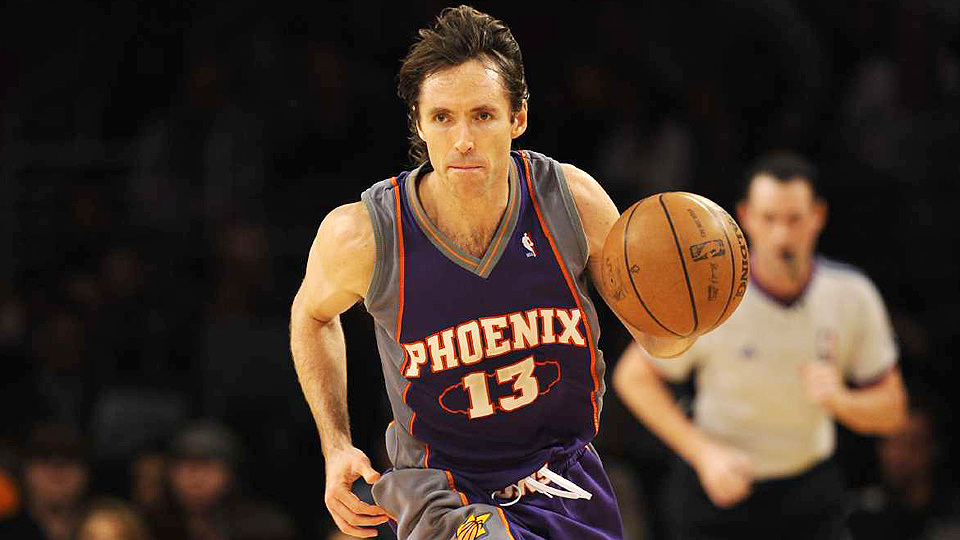The two-time NBA MVP orchestrated a decade-defining Phoenix Suns offense. But we can still learn to appreciate him.
Nothing about Steve Nash’s basketball career made any real sense. How an unrecruited, average-sized Canadian who picked up the game late became a two-time NBA MVP who defined a generational shift in playing style and inspired future superstars is something I’ll never quite understand. But it’s all true, and it’s worth reflecting on the incredible nature of the journey Nash took to immortality as he enters the Naismith Basketball Hall of Fame on Friday.
Much is made of how Nash and Mike D’Antoni changed the offensive paradigm of the NBA. This is true: the Seven Seconds or Less Suns that Nash led focused on keeping a high pace and finding quick strike opportunities while being open to taking more three-pointers than anyone else. We see Nash’s style reflected in both the Warriors (helmed by one-time Suns GM Steve Kerr) and Rockets(coached by D’Antoni), and it’s been mimicked to varying levels of success elsewhere.
What we’ve seen over the years is that playing like Nash’s Suns requires a point guard like Nash. That’s hard to come by. Nash was legendarily good. Stephen Curry isn’t the passer Nash was, but is more athletic and has deeper range, a quicker trigger, and fewer qualms about firing away. James Harden isn’t as decisive as Nash was, but has the athleticism, strength and willingness to score 50 if that’s what is required.
For some reason, even as he won MVPs, Nash seemed attainable. He wasn’t! An average-sized late bloomer with shaggy hair and constant back injury concerns, he may have presented as everyman. But he wasn’t. Watching him orchestrate an offense should have convinced you of that.
Perhaps Nash’s greatest accomplishment didn’t come in that first season in Phoenix or in the years the Suns warred against the Spurs in the playoffs, but in 2005-06, when Amar’e Stoudemire missed all but three games after microfracture surgery and Nash elevated third-year French weirdo/genius Boris Diaw to star level. Nash won the MVP that season and the Suns went to the conference finals. That should have been proof enough for a copycat league that it was going to be really, really hard to copy Nash. He was really one of a kind.
Nash is the first player from those Suns teams to make the Hall of Fame, and may be the only one to get in. Shawn Marion, a high-end defender and solid supplemental scorer, has a case, and so does Stoudemire. Joe Johnson rode along for a portion of the Suns’ run, and could get in eventually, though based far more on his Hawks exploits. (The Joe Johnson Hall of Fame debate is going to be a very strange experience for everyone who lived through Joe Johnson’s career.) D’Antoni will be inducted sooner rather than later, even if the Rockets can’t win a title during this run.
But isn’t that something? The Suns defined the decade even without winning a championship, and did it with (probably) one Hall of Famer. That’s how special Nash was. I was among those who railed against his MVP awards, supporting Shaq in 2005 and anyone but Nash in 2006. I, like many others, felt Nash received undue deference due to being white, being popular with the media, and reviving the loaded concept of pure guard purity.
In retrospect, what Nash accomplished with really good but sub-elite players around him was remarkable, and worthy of accolades. (Maybe not that first MVP, though. Don’t forget too that Nash was awful close to winning a third straight MVP in 2007 — old running mate Dirk Nowitzki edged him, resulting in that famously forlorn recognition after the Mavericks were punked out of the first round by the Warriors. What an era.)
That so few point guards have been able to evolve like Nash did, even in a golden era for point guards, speaks to Nash’s unique nature, talent, and drive. Nash got better with age. So has his legacy. The Hall of Fame induction is a good milestone in which to reconsider what we thought we knew about the legacy of each figure honored. Nash’s is still being written.
